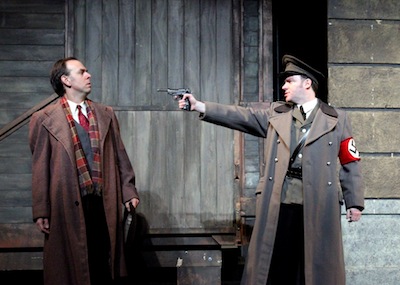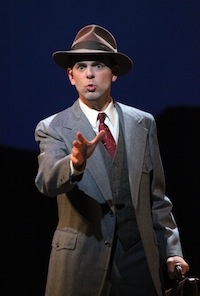One of the most stirring moments in “Wallenberg” — the epic musical now in its world premiere at the White Plains Performing Arts Center — comes at the top of Act 2, when Budapest’s Jews are huddled on a railcar in late 1944, bound for certain death in a Nazi extermination camp.
A single hand juts through a barred window and we hear the song, “Prayer.”
“Oh, Lord, hear our desperate cry. Please, Lord, don’t stand idly by. This can’t be what you have planned. Won’t you stay the devil’s hand?”
By the song’s end — as the lines “please rescue us, somehow” echo — that one hand gives way to one man, Raoul Wallenberg, standing atop the railcar, targeted by Nazi gunmen.
“This train isn’t going anywhere until every one of my Swedish citizens is released,” he shouts.
In an age long before the word “heroic” was applied to Little League pitchers who strike out the side, Raoul Wallenberg was a genuine hero. The Swedish businessman-turned-diplomat’s efforts reportedly saved 100,000 Jews in Budapest in late 1944.
True story: He used official-looking phony documents called “shutz-passes” to protect Jews from Nazis and the equally brutal Hungarian Arrow Cross.
True story: When he learned that the Nazis would tie three Jews together, shoot one and throw all three in the Danube to drown, he hired strong swimmers to fish them out.
True story: He convinced Hungarian officials to cancel planned deportation of Jews and the bombing of the Budapest ghetto.
He was the man atop the railcar, one man doing what he could to make a difference.
With a cast of 26 and 29 songs (plus reprises), “Wallenberg” is a big, ambitious musical at an ambitiously refocused White Plains Performing Arts Center.
Directed by WPPAC’s artistic director, Annette Jolles, it is the first endeavor in a season of new musicals and plays to be presented at the venue in the City Center mall in downtown White Plains.
The book and lyrics are by Kleban Award-winning librettists Laurence Holzman of Dobbs Ferry and Felicia Needleman of Larchmont, who serve as the venue’s executive director and literary manager. The music of “Wallenberg” is by Benjamin Rosenbluth.
As the title character, Broadway veteran Scott Mikita (“Phantom of the Opera”) rarely stands still, a young man in a hurry, thinking on his feet, browbeating Nazi footsoldiers, hobnobbing with Hungarian officials and going toe-to-toe with Adolf Eichmann, the pitbull dispatched by Hitler to dispose of Budapest’s Jews.
Mikita’s voice is strong and clear and his portrayal finds al the nuances the role requires. In Mikita, Wallenberg is charming, thoughtful, cornered, desperate, emotional and driven. If there aren’t many warts on our hero, there are certainly many shades of the man, shades Mikita fleshes out in a heartfelt and three-dimensional performance.
Joe Cassidy does fine work as Eichmann, whom he plays as a man with oily charm and confidence born of the single-minded pursuit of one goal.
The 80-minute first act is nearly as long as many contemporary Broadway musicals, which have become intermissionless affairs.
There are many storylines — perhaps too many — and each is given a song.
There’s the pregnant widow and her daughter (Lauren Lebowitz and Sophia Roth), the baroness and her Arrow Cross husband (Leah Horowitz and Mark Campbell), the orphan who looks up to Wallenberg (Benjamin Milan-Polisar), and the downtrodden Jews of Budapest played by an excellent, full-throated ensemble.
If Act 1 tends to lag under all those stories, “Wallenberg” hits its stride and finds its heart in Act 2.
After the haunting “Prayer,” Wallenberg shares the fears and uncertainty he can’t write in letters home to Stockholm in “Can I Tell You?” a duet Mikita sings with Alice Evans as his mother, Maj.
“Three Hungry Fisherman,” a sing-songy sort of nursery rhyme, arrives ingeniously at one of the evening’s tensest moments, as Wallenberg and two compatriots wait along the Danube to see if the swimmers will succeed or not.
Then there’s the lovely “The Lilacs Will Bloom,” in which Wallenberg and the baroness sing hopefully of life after the war:
“The countless shades of purple, the fragrance in the air, the blossoms that dot the local hillsides everywhere — one day they will return, you’ll see; we’ll breathe in that perfume. Yes, the lilacs will bloom again.”
Rosenbluth’s score is effectively eclectic, from the stirring strains of “Lilacs” to the whirling klezmer feel of “Another One of Us.”
And then there’s “Anna,” a breathtaking ballad that Wallenberg’s driver, the impeccable Nick Verina as Vilmos, sings about his lost wife. It ebbs and flows from the simple to the lush, all the time building emotionally in a heart-rending expression of how precious one life can be.
The production values are high here.
Darren Cohen’s off-stage orchestra is note perfect and doesn’t overpower. The sound, by Jim van Bergen and Michael Eisenberg, is fine. Gail Baldoni’s costumes are period and evoke the time.
Chris Dallos’ lighting design effectively creates mood on Lauren Helpern’s platformed set. Helpern employs sliding panels that suggest settings, with columns and walls materializing in different configurations and the sparest of furniture.
Jolles directs briskly — but not at a breakneck speed — in a show that runs close to three hours and covers much ground. She has a fine eye for creating stage pictures and with 26 actors to move around the stage, her palette is full.
In an age when commercial theater looks to the relative safety of movies or comic books for source material, “Wallenberg” is an important, sweeping work about a man whose story is largely lost to history.
In January 1945, Raoul Wallenberg met with the incoming Soviets and was never heard from again.
But that is not the story of “Wallenberg.”
In the end, he couldn’t save them all. That railcar pulls away slowly, and the wailing cries of the condemned can be heard inside.
But Wallenberg’s legacy is in succeeding generations of those he did save.
It’s in, as the final song relates, “A Million Tomorrows” his work made possible.
Wallenberg” White Plains Performing Arts Center, 11 City Place, White Plains. Through Nov. 21. 8 p.m., Thursdays through Saturdays; 2 p.m., Sundays and on Nov. 4; 8 p.m., Nov. 9 to commemorate Kristallnacht; 10:30 a.m., Nov. 18. $49. 877-548-3237 for tickets; 914-328-1600 for details. Go to the White Plains Performing Arts Center’s website.


